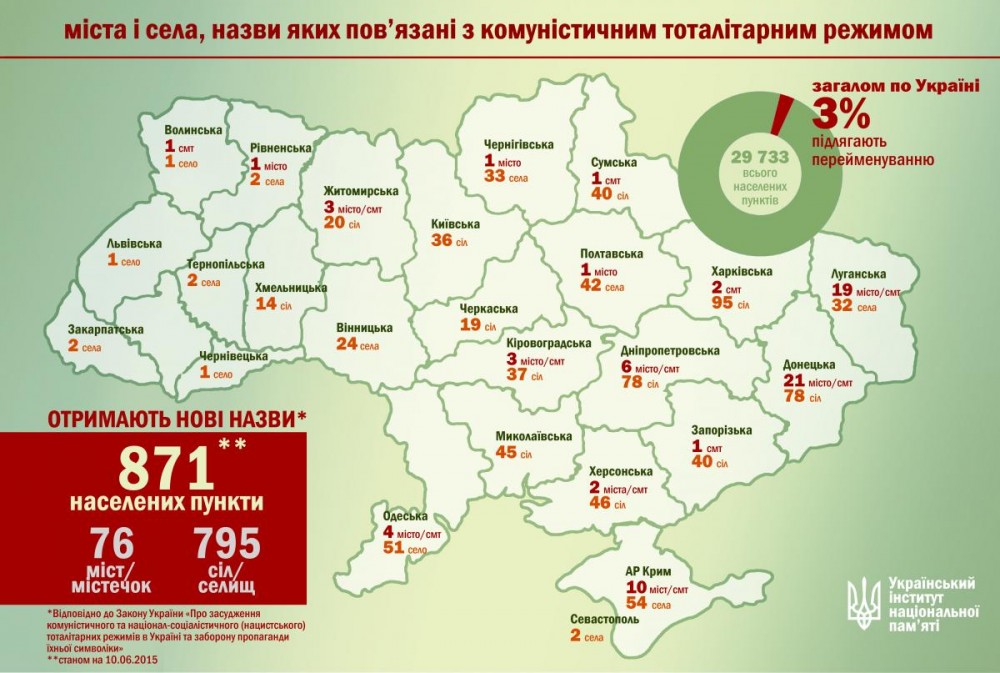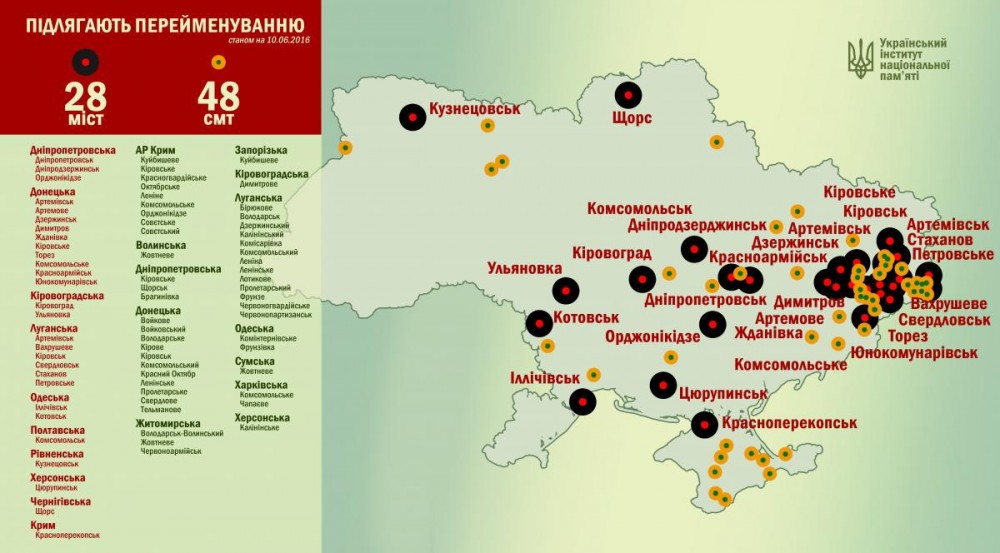De-Sovietization in Ukraine: 871 cities, towns and villages freeing their names from the Soviet legacy

Map of renaming: 3% or 871 of Ukrainian cities, towns and villages are to be renamed by November 21, 2015, which is the Day of Freedom and Dignity in Ukraine (Image: the Ukrainian Institute of National Memory)
Communities of 871 Ukrainian cities, towns and villages will give them new names or return to their historical names by November 21, 2015. This is 3% of all populated settlements. The Ukrainian Institute of National Memory (UINM) published a list of cities and villages, whose names symbolize the communist totalitarian regime (an interactive version of the list in Ukrainian can be accessed here).
According to UINM‘s monitoring, in accordance to the law “On the Condemnation of Communism and the National Socialist (Nazi) Totalitarian Regimes in Ukraine and the Prohibition of Propaganda of Their Symbols” subject to change name 76 cities and towns (settlements) and 795 villages and towns (data are being updated) – as reported by the Ukrainian Institute of National Memory. The corresponding map posted on the website of the Institute and page on Facebook.
Nearly 30,000 thousand names of Ukrainian cities, towns and villages are being processed by UINM staff and volunteers. The data are constantly being updated, for example, to the list of 22 cities that need renaming six more have been added just recently. The number of towns that need renaming has increased as well: from 44 to 48. So, the list of settlements to be renamed is increasing, although not significantly.
The historians explain that sometimes the origin of the names requires additional research. For example, the village in Lviv oblast with a seemingly ordinary name “Maximovka” memorialized the NKVD officer Maximov, who had fought against the UPA. The Company has since 2008 tends to return the historical name of the village Libuhova. A village in Kharkiv oblast, Khrushcheva Mykytivka, despite the obvious analogy, named even in XVII-XVII centuries after two Cossacks: in 1676 Colonel Mykyta Senenko, the commander of the Uman Regiment, granted the charter to this land, and in 1738, Mykytivka got a new owner – Colonel Ivan Khrushchev, the commander of the Nijinsk Regiment.
“Why should the local community decide on the renaming and not ‘Kyiv experts’ or the government? Not only because it is the fundamental right of local government, but also because their residents and historians are better aware of the name, “- explains Volodymyr Vyatrovych, the Chairman of the UINM.
He stressed that “The law defines only the elements that are unacceptable to use as geographic names in the modern democratic and independent country, but it does not specify how to name your street, village or town. Each community will independently formulate proposals for a new name, whether it is its historic name or to honor famous people, including ones from that community.”
Symbolically, the communities have to make the decision to free themselves of the totalitarian legacy embedded in their current names by November 21, 2015, which is the Day of Freedom and Dignity in Ukraine. After that, Ukraine’s parliament will confirm the renaming within a 3-month period. Within the six months, local governments will also define new names for streets, squares, and other geographical features.
To be changed are those names that use the names or aliases of the persons who occupied managerial positions in the Communist Party (from Secretary of the District Committee and above), senior government and administration of the USSR, the Ukrainian SSR and other Soviet republics, and employees of the KGB.
Also subject to change are names that use the name of the USSR, the Ukrainian SSR, other Soviet republics and their derivatives, also the names associated with the activities of the Communist Party, anniversaries of the October Revolution, the establishment of the Soviet power in Ukraine or in its administrative units, and prosecution of fighters for Ukraine’s independence.
Legal entities should change their names within a month by June 21, while mass media firms – by 21 August. Trade marks for goods and services, which fall under the law should be changed by 21 November. Exceptions to the law are the names associated with prominent Soviet figures of Ukrainian science and culture, as well as with the movement of resistance to the Nazi occupation and their expulsion from Ukraine.
The de-Sovietization laws came into effect on May 21, 2015. Their implementation means that Ukraine finally and irrevocably brakes with its painful Soviet totalitarian past. The map of the country will now be freed of totalitarian symbols in its names and monuments, and the access to the records of Soviet repressions and crimes against humanity will be fully open.
Политика конфиденциальности | Правила пользования сайтом








